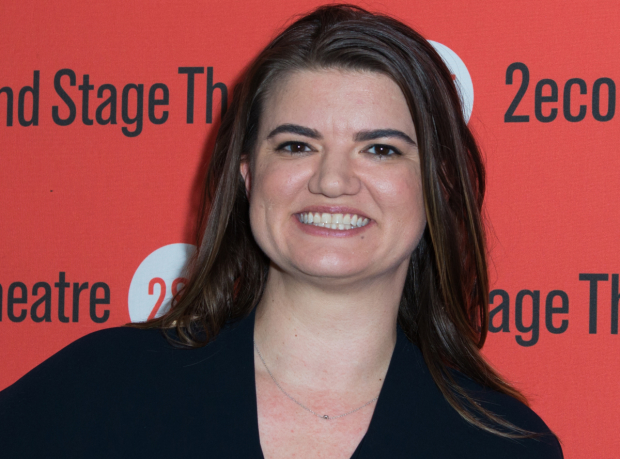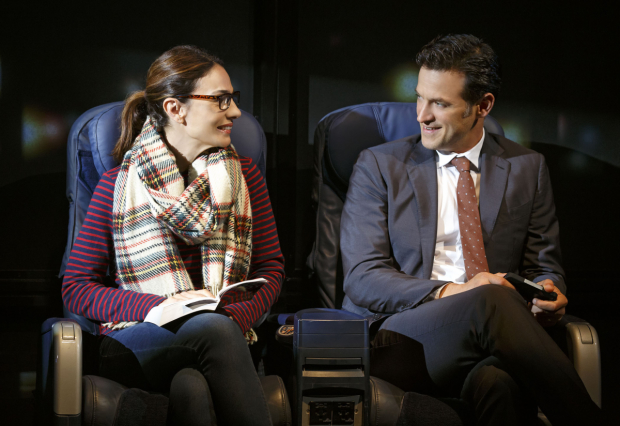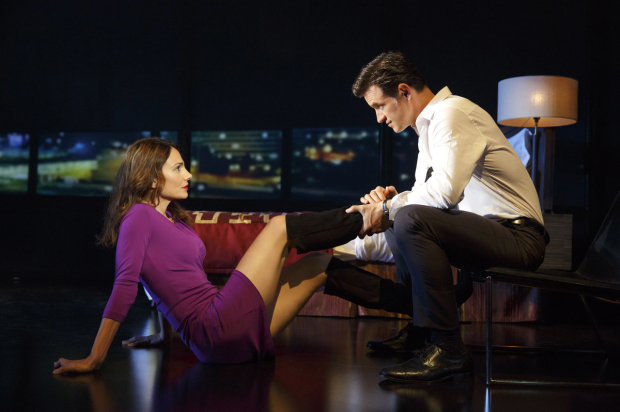Bachelorette Scribe Leslye Headland Explores the Dark Side of Sex and Intimacy in The Layover
The newest play from the creator of ”Bachelorette” and ”Sleeping With Other People” is anything but a rom-com.
Lesyle Headland's new play The Layover, now running off-Broadway at Second Stage Theatre (the company that produced her hit Bachelorette), opens with a business-class meet-cute between Shellie and Dex, two passengers on a delayed flight to New York City. But the light-hearted sexual tension isn't destined to last. Before long, the play has the tense feeling of a noir crime novel or, as Headland put it, "whatever the opposite of a rom-com is."
The gradual shift in the The Layover's vibe was a conscious choice on the part of Headland, who first envisioned the play as a version of Patricia Highsmith's psychological thriller Strangers on a Train. "I love sort of stacking the audience against themselves," she explained, "I like the idea of starting the play with them doing a meet-cute where you're like, 'These guys are great. I hope they f*ck each other.' And then it's like, 'Oh…but wait, he's an asshole, oh no but wait, he's in love with her.'"
Headland was also interested in using a version of Highsmith's narrative (two men who meet by chance and agree to swap murders in order to avoid suspicion) to continue an exploration of intimacy she began with her 2015 movie Sleeping With Other People. Though Sleeping With Other People was an ultimately happy film about two people working to achieve emotional intimacy, Headland believes it represents the "opposite sides of the coin" as The Layover, which explores the messy fallout of a one-night stand.

(© Allison Stock)
What aspects of Strangers on a Train were you excited about putting your spin on?
In the book there's this really interesting thing that keeps coming up for both of the men, which is that they feel psychically connected to each other and that they sort of can't escape the other person…So I thought it would be interesting to do that with a man and woman. And to do it from a romantic angle of, "Oh you know, we can sleep with each other in this sort of weird situation that we've found ourselves in." Obviously they don't have anything connecting them, so it's like this get-out-of-jail-free card — the only people that will really ever know are the two of them. To me there was a such a great, clear line between swapping murders and having a very brief love affair that literally no one would ever know about. I'm just like, "Isn't it all sort of the same?" Isn't it we're just all basically acting out this weird drama with ourselves — whether that's having sex or pooping or murder? I mean obviously they're not the same, but there are parallels, I think, to all these different aspects of human existence. I see it as my job as a writer to sort of draw those lines between everything and say, "Hey, don't you think this is interesting?"
What has drawn you, recently, to explore the idea of intimacy in your writing?
I think the reason I find intimacy to be so interesting is because I don't think it's something I see that often in stories. I can see characters having intimacy, but I very rarely see a story that's just about that. The Layover is about the intimacy that springs up between people that only have a physical relationship and that's it. They know zero other things about each other.
So much of intimacy is communication. I think you can have sex without love, for sure, as I have many, many times. I just don't think you can have sex without communication. I think you do always communicate with the person that you're being physically intimate with. I think it's impossible not to. Your body and that other person's body are going to be communicating with each other and [controlling] whether or not that falls into what your plan was. The idea that your mind is more powerful than your body or your soul is just, I think, categorically untrue. And the reason I feel confident saying that is because that's been my experience as a human on earth.

(© Joan Marcus)
You write a lot about bad behavior. Why is that something you continue to be interested in?
I don't think morality is relative, but I do think ethics are relative. So what I think is sort of interesting is, it's really easy to just go, "Well, I wouldn't do that." Like, "Well, yeah, until you're in that situation." I think that's what I always find to be so interesting about bad behavior and immorality. A lot of the time you think you can look down on it or you can feel sort of better than the characters when you're in the audience. But once you start being given enough information and you notice yourself flip-flopping, what happens then to you as an audience member?
Is there any aspect of The Layover that you wish more people caught on to?
My hope is that I haunt you so severely that the next time you're in a situation where you have to make a choice or you find yourself sort of engaging with some bad behavior that you suddenly realize that you are in a particular situation you've seen before. I just basically want to bury myself in your subconscious. That's why I don't put a lot of stock into people's reaction during the performance, because really, if the play is doing what it's supposed to do, you won't really feel the repercussions of it until weeks, months, or years into the future.

(© Joan Marcus)










